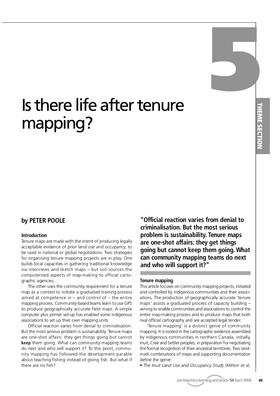
Peter Poole describes two strategies for organising tenure mapping projects: partial participation – where the community learns to gather traditional knowledge using interviews and sketch mapping, but where all computerised aspects of map-making are outsourced – versus complete participation, where community members are trained in all aspects of map making. It is too easy when sharing experiences relating to PGIS practice to focus on success stories, and for practitioners to be hesitant in engaging in critical reflection relating to their own work. These important but little discussed issues include potential pitfalls that projects might face, the concerns surrounding precision, and the ethics of the practice. Poole illustrates his article using a number of case studies from around the world, before going on to raise important questions over the sustainability of such projects.
Participatory Learning and Action (PLA, formerly PLA Notes) is the world's leading series on participatory learning and action approaches and methods. PLA publishes articles on participation aimed at practitioners, researchers, academics and activists. All articles are peer-reviewed by an international editorial board. See: www.planotes.org
Article in: PLA 54. Guest-edited by: Giacomo Rambaldi, Jon Corbett, Michael K. McCall, Rachel Olson, Julius Muchemi, Peter Kwaku Kyem, Daniel Wiener, Robert Chambers
Cite this publication
Available at https://www.iied.org/g02948